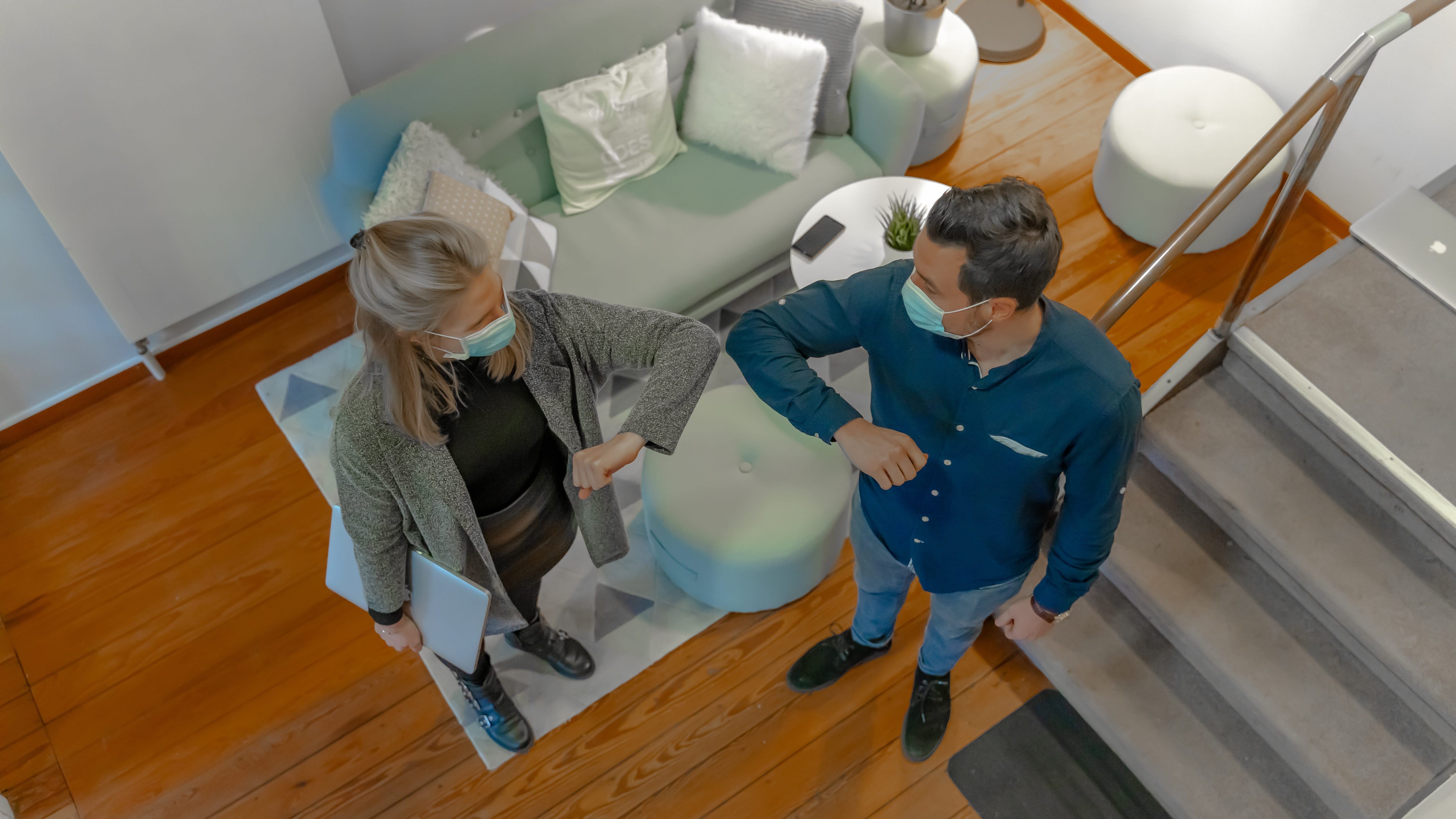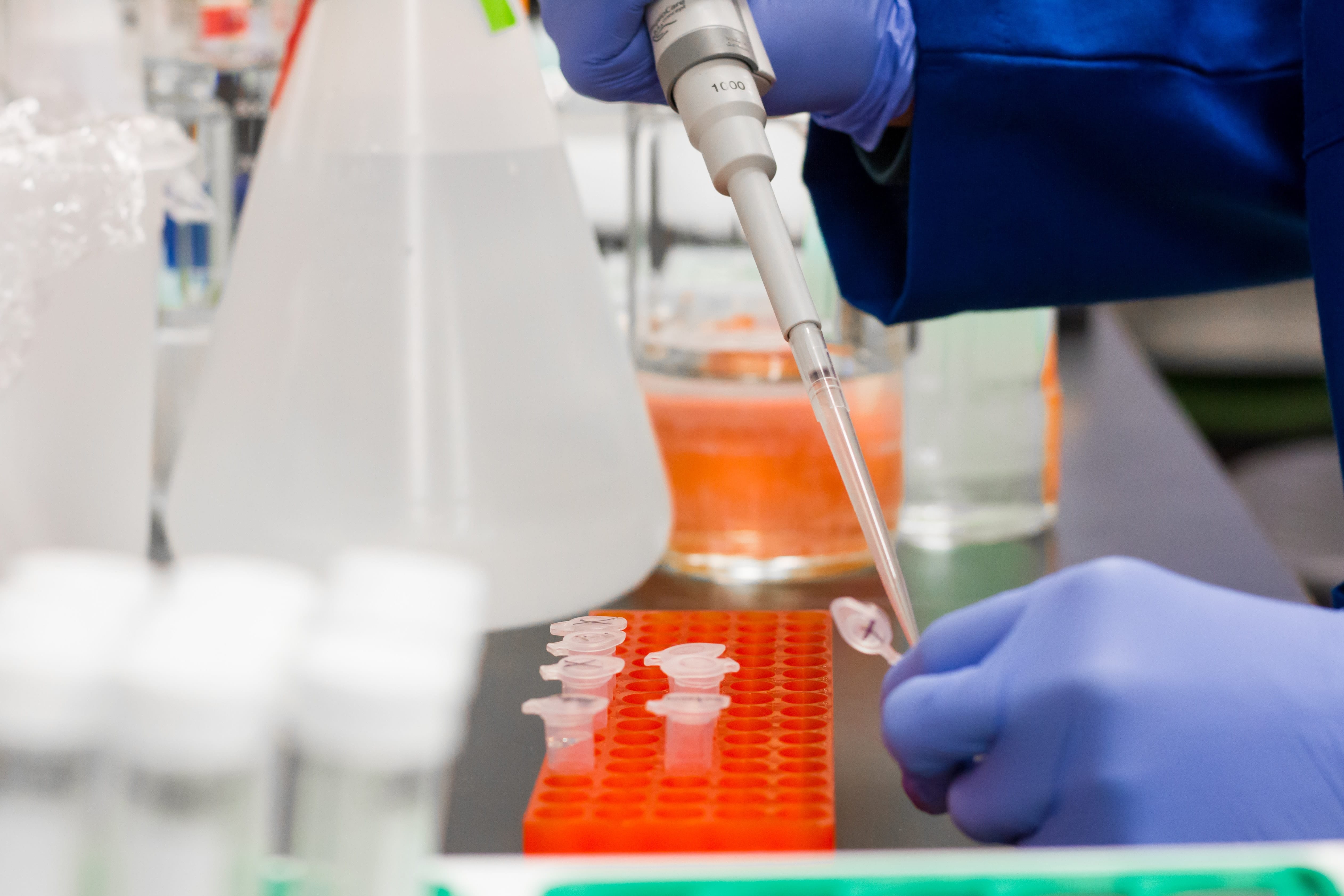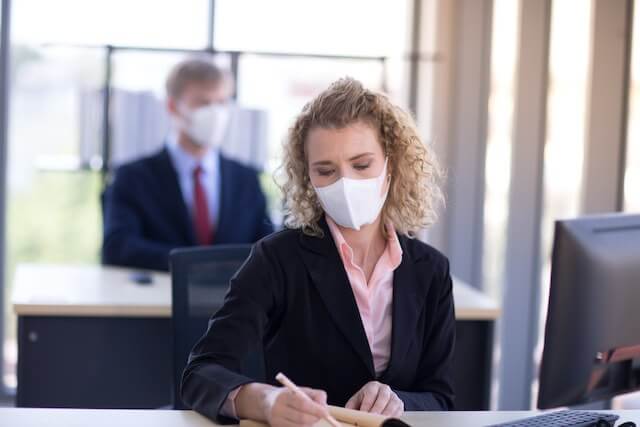Return to Work – Sample Action Plan

At Exude, it is our priority to keep our employees and our clients healthy, especially amid the COVID-19 pandemic. This return-to-work action plan details how organizations can reopen their business and keep employees safe to every extent possible. This plan, which pulls from Centers for Disease Control and Prevention (CDC) and Occupational Safety and Health Administration (OSHA) guidance, highlights the responsibilities of managers and employees and outlines the steps to address COVID-19.
While leaders will implement various protocols to ensure office safety, it’s up to the employees to execute on these protocols daily. By releasing this return-to-work action plan, we hope to clearly communicate our suggestions moving forward, highlight workplace protocols in place to protect employee safety and establish a level of comfort for all employees as you return to the office. We understand that every employee’s situation is different and encourage those with specific risks or concerns to reach out to their manager or HR to discuss alternate arrangements, should they be necessary.
Due to the evolving nature of the COVID-19 pandemic, creating an exact timeline for resuming “normal” operations is not feasible. Your leadership team should continue to monitor applicable state and local guidance and determine next steps for reopening the office. At this time, we’ve created a tentative phased approach for asking our employees to return to work, although things can quickly change based on local, state and federal guidance.
Return to Work Timeline
Due to the evolving nature of the COVID-19 pandemic, creating an exact timeline for resuming “normal” operations is not feasible. Your leadership team should continue to monitor applicable state and local guidance and determine next steps for reopening the office.
At this time, we’ve created a tentative phased approach for asking our employees to return to work, although things can quickly change based on local, state and federal guidance.
Office Closure
This is the first stage of reopening and guidance prohibits gatherings of 10 or more people. At this time, the office will likely remain closed to employees, vendors and visitors unless necessary. Employees who can work remotely are asked to continue doing so until further notice.
Phase One
Under Phase One, the office may reopen. Leaders should evaluate whether it is possible to open our office and permit a maximum of 10 essential employees to return to work. Social distancing protocols will be put in place and should be followed. However, any other employees who can do so should continue to remain home and work remotely. Under Phase One guidance from the government, nonessential travel should be avoided. Business-related travel will not resume under Phase One.
Phase Two
Under Phase Two, the office may reopen to more employees. Government guidance states that in Phase Two, gatherings of up to 50 people are permitted. As such, we will review our situation, consider opening our office and permit a maximum of 50 employees to return to the office. will observe governmental guidelines related to occupancy and capacity given our office’s square footage. Like Phase One, employees who can work from home should continue to do so. Access to the office will be granted for job roles that are critical to business operations or for employees who are not able to work remotely.
Should we reopen our office in this limited capacity, social distancing protocols will be put in place and workplace modifications may be made to ensure social distancing can be maintained throughout the workday. The following protocols will be put in place to ensure our headcount in the office does not exceed 50 employees and to promote social distancing efforts:
- Staggered and monitored schedules— Leaders should implement a tracking system for employees to request and record their attendance in the office. Additionally, rotating schedules should be used until all restrictions are lifted to minimize employee contact.
- Workstation modifications— Leaders must modify the office layout to create at least 6 feet of distance between employee workstations, and face-to-face desk layouts will likely be changed.
- Prohibition of in-person meetings—Until all social distancing requirements are lifted, your organization will have to ban in- person meetings. Instead, employees should conduct virtual meetings. Employees who are in the office should avoid gathering in groups.
In addition to the protocols mentioned above, may implement additional guidance during Phase Two that is designed to promote workplace safety.
Finally, although governmental guidance dictates that nonessential travel may resume under Phase Two, business-related travel will remain banned. A travel approval workflow will be implemented once most states have entered Phase Two of the federal government’s plan. Any employee who travels should follow self-isolation guidelines and not return to work during the isolation to ensure the safety of their peers.
Phase Three
Under Phase Three, the office may reopen to all employees. Your organization must consider reopening the office and what protocols need to be implemented in order to ensure the health and safety of employees. At this phase, leaders may also consider resuming business-related travel.
Considerations
It’s important to note that these phases are tentative and are subject to change based on state and local guidance, and the pandemic itself. Should an employee test positive for COVID-19 after the office reopens, your plan may change to protect other employees. In addition, if cases of COVID-19 spike again in our state or in our local area, we will consider whether to remain open or close.
We recognize that everyone will need to make a personal decision as to when they are comfortable returning to the office based on individual circumstances. Please reach out to your supervisor, manager or HR to discuss your personal situation.
Workplace Protocols to Follow When Returning to Work
Below are various workplace protocols designed to preserve the health and safety of employees as they return to work. This section further explains these protocols. For additional information, please reach out to your manager or supervisor to find out what your organization.
Employee Screening, Exposure and Confirmed Illness Protocols
Keeping employees safe is top priority. To accomplish this task, we have created various suggestions for screening employees who return to work, dealing with exposure to COVID-19, responding to a confirmed case of COVID-19 and reporting transparency.
Employee Screening Protocols
The Equal Employment Opportunity Commission permits employers to measure employees’ body temperatures before allowing them to enter the worksite. Any employee screening will be implemented on a nondiscriminatory basis, and all information gleaned should be treated as confidential medical information—specifically, the identity of workers exhibiting a fever or other COVID-19 symptoms should only be shared with members of company management with a true need to know.
Another suggestion is asking employees to confirm the status of their health as part of working in the office. Your organization reserves the right to implement a screening protocol for symptoms, such as temperature checks or signed certifications, at any point. Results should be tracked separately from any personnel records and will be kept confidential. This protocol will commonly be implemented upon initial opening of the office and as a response to a confirmed diagnosis. Employees unwilling to complete a screening will be required to work remotely.
COVID-19 Exposure and Confirmed Illness Protocol
Employees who test positive for COVID-19 or believe they have been infected will be instructed to follow the advice of a qualified medical professional and self-quarantine. When self-quarantining, employees should:
- Stay away from other people in their home as much as possible, staying in a separate room and using a separate bathroom if available.
- Not allow visitors.
- Wear a face mask if they have to be around people.
- Avoid sharing household items, including drinking cups, eating utensils, towels and bedding.
- Clean high-touch surfaces daily.
- Continue monitoring their symptoms, calling their health care provider if their condition worsens.
When an employee tests positive for COVID-19, deep-cleaning procedures should be triggered. Furthermore, employees who have been in close contact with an individual who has tested positive for COVID-19 will be instructed to self-quarantine.
Reporting Transparency Protocol
Any employee who experiences COVID-19 symptoms or has tested positive for COVID-19 must notify HR as soon as practicable. The employee will be asked to assist with contact tracing. This information will be tracked separately from personnel records, and names will not be released. Depending on the circumstances, your team should notify impacted employees if there is a confirmed case of COVID-19 in the workplace. You also may elect to close the office for a period up to 72 hours following a confirmed case to allow for natural deactivation of the virus.
Social Distancing Protocol
Employees should follow social distancing best practices while at ’s facilities, including but not limited to workstations, cafeterias, common areas and office spaces. Specifically, employees are asked to:
- Stay 6 feet away from others when working or on breaks. Where a minimum distance cannot be maintained, engineering or administrative controls will be in place.
- Avoid job tasks that require face-to-face work with others when possible.
- Avoid contact with others whenever possible (e.g., handshakes).
- Avoid touching surfaces that may have been touched by others when possible.
- Distance themselves from anyone who appears to be sick.
- Avoid gathering when entering and exiting the facility. Employees should also only enter and exit designated areas.
- Follow any posted signage regarding COVID-19 social distancing practices.
- Disinfect their workspace often.
- Avoid touching their face.
- Avoid nonessential gatherings.
- Stagger lunches to limit the number of individuals in the break room or cafeteria.
- Avoid using common areas.
Leaders may extend social distancing guidelines after the office reopens. Encourage employees to monitor their emails and adhere to any additional guidance as it is provided.
Employee Health and Safety Protocols
The success of your return-to-work action plan relies on how well your employees follow social distancing and health and safety protocols. As such, the following protocols should be implemented to ensure employee health and safety. Please bring any concerns regarding the following protocols to a manager or supervisor immediately.
General Employee Health and Hygiene
Practicing good hygiene is essential to prevent the spread of COVID-19. Do your part by practicing good hygiene at work and at home:
- Regularly wash your hands for at least 20 seconds throughout the day with warm water and soap, specifically before eating.
- Cover coughs and sneezes.
- Avoid touching your eyes, nose and mouth.
To help employees remain healthy, provide hand sanitizer and disinfecting wipes available throughout the office. It is suggested that employees wash their hands more frequently than normal. Additionally, cleaning crews should disinfect key areas such as faucets and door handles daily.
In addition, employees are strongly encouraged to wear face coverings when in public and when physical distancing of 6 feet or more cannot be guaranteed. Employees will provide their own face coverings in accordance with CDC guidelines. It is recommended that employees wear face coverings when entering and exiting the building and when using common areas such as bathrooms, kitchens and the lobby. Consider maintaining a small inventory of disposable masks and gloves as a backup to employee-provided PPE.
Finally, employees who are feeling sick are asked to stay home from the office. Employees who have symptoms of acute respiratory illness, should immediately seek medical attention and follow the guidance of a health care provider. Employees with symptoms are required to work remotely or take PTO. Employees who have been diagnosed with or are aware they’ve been directly exposed to COVID-19 should notify HR.

